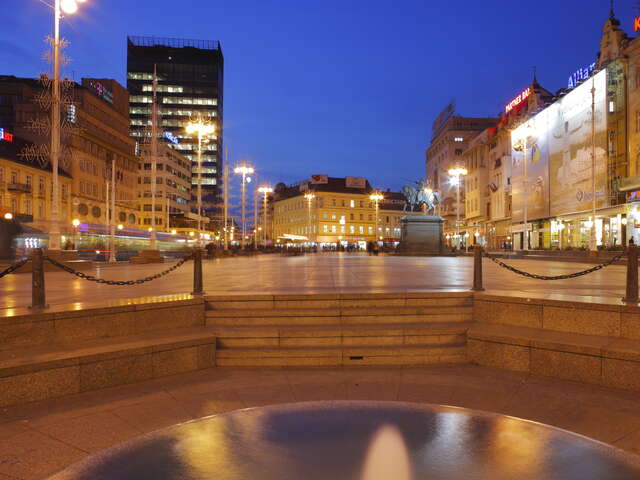
From an isolated backwater behind the Iron Curtain, Croatia has transformed itself into Eastern Europe's 'Riviera'. Sun worshippers discovered the miles of sunny, pristine beaches and dramatic cliffs of the Dalmatian coast.
Other tourism followed for ancient and historic monuments, including UNESCO world heritage sites and even some communist concrete architecture, spellbinding natural beauty featuring islands, waterfalls, and mountains, and the good life of good wine, good food, and a more relaxed atmosphere than other busier – and more expensive – European coastal holiday destinations.
Recently named one of the top three most beautiful and affordable travel destinations, you don't want to miss these! Top 10 Reasons to Travel to Croatia:
1 The Beaches
The best beaches in Croatia are Dalmatian. (Not the 101 spotted dogs, but the coast in Dalmatia). White pebbles (and in some places, sand), crystal clear aquamarine water, hidden coves with rocks and fig and olive trees… these are the beaches that put Croatia on the map. If your idea of beach lifestyle is a quiet hideaway, or waterfront party, there's a beach in Croatia for you.
2 Diving and Snorkeling
Some travelers get up closer to that incredibly clear sea. While it's not like the Caribbean for a rainbow of tropical fish close to the surface, the pebble and stone coastline makes for fantastic underwater visibility. And with its long, seafaring history, there's plenty to see: underwater wrecks of wine and olive oil cargo ships dating back thousands of years, right up to recent war ships. There are also some novel diving experiences like the Te Vega Sea Lake, reached by an underwater tunnel, the Blue Cave, even a reef with yellow coral.
Top Photo Author : Ivo Pervan Source: Croatian Tourist Board
3 Sailing, Yachting, Boating
The coast of Dalmatia is a sailor's paradise! The best way to enjoy the dramatic cliffs rising from dark blue waters, countless scattered islands, hidden coves, untouched coastline, and seaside towns, is from the water. You can rent a sailing boat with or without crew, or charter a yacht or catamaran to take you to remote coastal towns where you can enjoy fresh seafood and local wine in restaurants, or to an isolated beach. Or just drop anchor and soak in the Adriatic atmosphere.
4 Plitvice Lakes National Park
This is Croatia's most popular national park and, many claim, Europe's most breathtaking natural wonder. Sixteen electric blue Plitvice Lakes inhabit a forested canyon, interconnected by stunning waterfalls, and easy-to-hike boardwalks and trails. A panoramic shuttle bus allows the less active traveler to take in the breathtaking scenery, and more active travelers will thrill at the views from the trails or rowing across the waters.
5 Dubrovnik
They call it the "Pearl of the Adriatic". The walled, seaside Dubrovnik seems to have it all: centuries-old forts surrounding an enormous, picturesque Old Town, scenic wall walks with dazzling views of the cliffs and sea, as well as its famous collection of baroque buildings on marble streets. Dubrovnik is considered one of the most beautiful cities in Europe, and the iconic view is at the top of a cable car ride to the peak of Mount Srd. Over a coffee at the café at the top, you can see the entire old city as well as the impossibly blue Adriatic Sea and nearby islands. Game of Thrones enthusiast? You can explore many of the series' filming locations, too.

Split Author : Ante Zubović Source: Croatian Tourist Board
6 Split
The heart and major city of the Dalmatian Coast, Split is an exciting urban experience. Its seaside promenade is bustling at all hours, and its massive Roman palace is the center of modern Split's lifestyle. Diocletian’s Palace was built by the Roman emperor of that name at the turn of the fourth century. From the outside, it's an imposing, walled fortress. But inside, you’ll find bars, restaurants and shops that make it a pleasure to stroll and get momentarily lost in the interior's winding narrow streets – every wrong turn takes you to an even better place to rub elbows with locals and other travelers and enjoy a different local wine!

Zagreb Authors: Mario Romulić & Dražen Stojčić Source: Croatian Tourist Board
7 Zagreb
Croatia's capital city isn't as popular as Dubrovnik or Split, but it's a terrific walking city with a café culture and some interesting museums. The museum that tops everyone's list is the Museum of Broken Hearts, designed to help the lovelorn get over a relationship… by contributing mementos of their ex to the museum collection, along with their stories. Single or happily coupled-up, this museum gets everyone talking!
8 Pula's Roman Amphitheatre
You'll find the city of Pula in Croatia's most Italian-feeling region of Istria that is also home to the Venice of Croatia. Pula's claim to fame is its breathtaking Roman ruins, and especially, the impressive and well-preserved amphitheatre. Dominating the city center, the amphitheatre remains at the center of life in Pula thousands of years after its construction. Don't miss the opportunity to attend a concert, festival or even movie screening in this ancient venue.
9 The 'Sea Organ' at Zadar
Zadar's historic churches and Roman ruins are contrasted with modern art installations that are putting this Croatian city on the map for cool- and art hunters. The Sea Organ transforms waterside waves into melodies, and the Sun Salutation creates light show visualizations of Sea Organ's 'tunes' via a 'Sun' set into the pavement. Worth the trip.

Author : Ivo Pervan Source: Croatian Tourist Board
10 Wine Tours
Croatia has a long history of wine making, wide range of indigenous grape varieties, and lots of geographically defined wine regions. Wine tourism is an increasingly popular way to enjoy the countryside and meet local vintners. A drive on the country's wine routes will bring you to picturesque vineyards (some with amazing views over the sea), historic and modern wine cellars and tasting rooms, and enthusiastic winemakers with uniquely Croatian flavors to share and discuss.
When to Travel:
If your travel plans to Croatia include the sea, especially swimming, snorkeling or diving, the best water temperatures are in the 'high season' summer months of July and August. But off-season travel to Croatia can involve great savings, and include the joys of the wine and produce harvest months, festivals, and even winter sports and spa resorts.
Smart Travel Tip: Currency
Croatia is not part of the EU; rather than the euro, the local currency is the kuna, which you exchange locally. A smart travel tip is to pre-pay as many arrangements as you can through your travel consultant so you can pay in your own currency and not worry about exchanging as much money or exchange rates at the time of your trip. Planning and paying ahead also helps you stay within your travel budget!
Start your Trip!
Copyright BestTrip.TV/Influence Entertainment Group Inc or Rights Holder. All rights reserved. You are welcome to share this material from this page, but it may not be published, broadcast, rewritten or redistributed.











